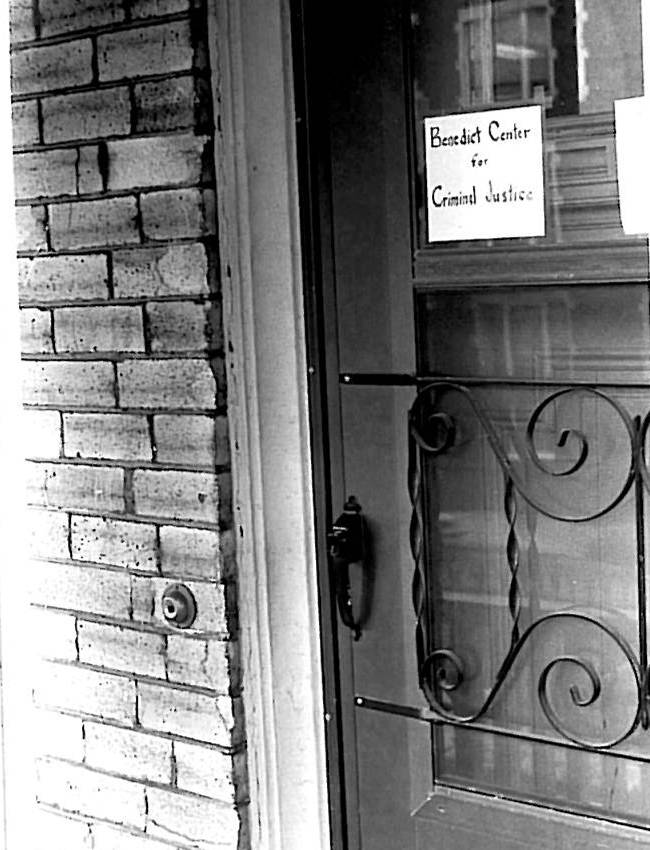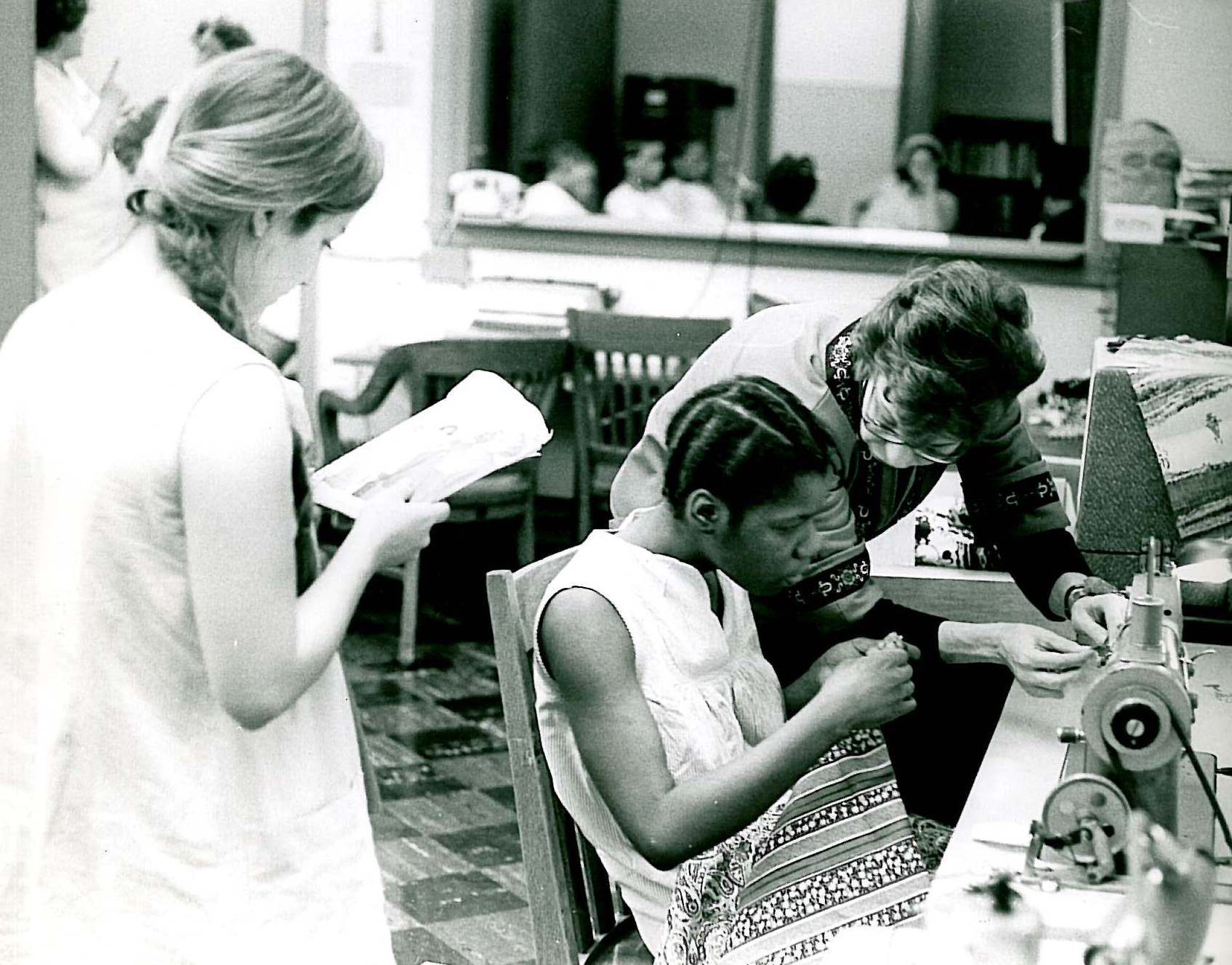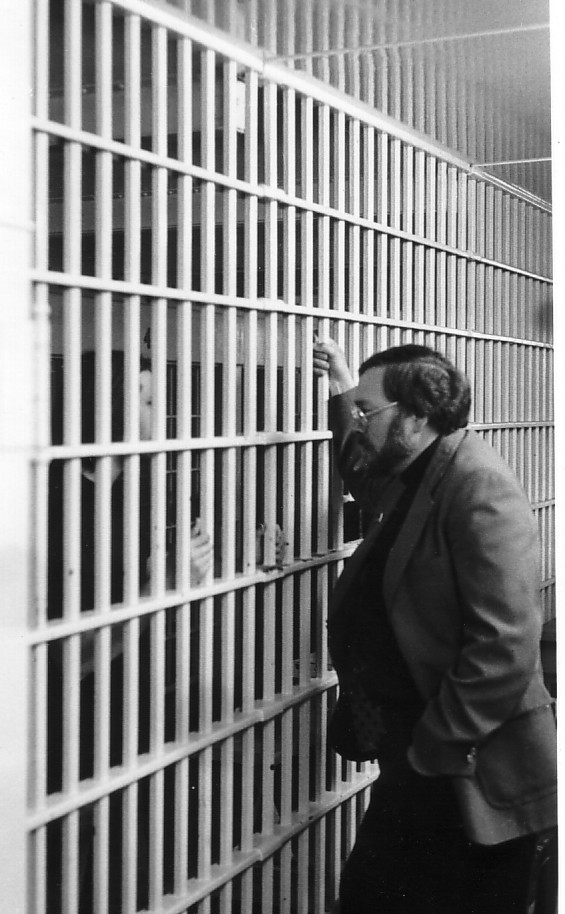|
View our 40th Anniversary Video
Over the years, there have been many changes to the Benedict Center – name, location, leadership. But one thing has never waivered. The Benedict Center’s mission is to work with victims, offenders and the community to achieve a system of justice that is fair and treats every one with dignity and respect.
In 1974, Margi Flanagan, a community activist, and Sister Rita Martin, a Racine Dominican, teamed up with Father Al Veik at St. Benedict the Moor and others committed to justice to found the Benedict Center as an educational alternative to jail for women. The new program was incorporated as the nonprofit, Citizen and Offender Programs in Education, or COPE. The following year, we became the Benedict Center for Criminal Justice, and in 1990 we simplified the name to the Benedict Center.
Helping the forgotten population
After conducting a survey that indicated women were the most neglected segment of prisoners, Sister Dorothy Wood was determined to change this situation. At its inception in 1974, the Benedict Center began the COPE “Citizen and Offender Programs in Education” as an individualized education program in the Milwaukee County Women’s she said. “We want to show them how to better themselves. One of my favorite sayings is give me a fish and I eat for a day, teach me to fish and I eat for a lifetime.” (Milwaukee Sentinel December 15, 1975). "There is a type of reversed discrimination and things are generally much harder for women when they get into jail because they are considered fallen women,"
With a team of seven part-time teachers, two part-time educational counselors and a cadre of 35-50 unpaid staff members began assisting female inmates on a one-to-one basis. From the beginning, Benedict Center programming was designed to meet the individual needs of each woman. In addition to adult basic education, classes included communication skills, family living, sewing, needlecrafts, yoga, child development, typing and shorthand, assertiveness training and Choices for Change. When sentenced women moved to the House of Corrections in Franklin in 1976, COPE began offering programming there as well.
The first high school graduation ceremony ever was held in the Milwaukee County Jail in1978 when two women earned their diploma from Pius XI High School through the school’s Adult Learning Center in cooperation with the Benedict Center.
Ministering to the Accused
The first of the Benedict Center's programs was the Jail Chaplaincy, a ministry to the men and women awaiting trial in the Milwaukee County Jail. Until 1995, the ministry was a shared program with St. Benedict the Moor. The chaplain was a Capuchin priest and later a brother from St. Ben's. The program officially came under the control of the Benedict Center in 1998, at which time a formerly incarcerated African-American Baptist minister, an African-American nondenominational female pastor and a Latino Roman Catholic deacon took over, reflecting the ethnic mix of the men, women and youth they ministered to in the jail.
Education to Action
In the early years of the Benedict Center, the focus was heavily on education -- not just of women in conflict with the law, but also the education of the community about the criminal justice system and the need for reform. The advocacy program, originally called the Alternatives Program, encompassed this work. Always activist from its small but mighty Midwestern roots, the Benedict Center was a founder of the National Coalition for Jail Reform, together with many high-powered civil liberties and legal organizations located on the East Coast.
The most visible community initiative undertaken in the early years was that of educating and organizing to win county approval for a new, progressively-designed "direct supervision" jail to replace the antiquated, unsafe and vermin-infested old jail. After defeating calls for funding a new jail for 15 years, the County Board approved the jail resolution in 1986, largely as a result of Benedict Center advocacy.
Another early program helped men and women return from jail and prison to the community. Ultimately, the Benedict Center's small staff drew others in the community together to help found Project RETURN, which continues to help hundreds of men and women reconnect to the community and find employment when they return home to Milwaukee from prison. Today, through development of Community Justice Centers, the Benedict Center continues that mission.
Values of Restorative Justice
The Benedict Center was founded on principles of restorative justice, which attempt to restore balance to justice by involving the victim, the community and the offender in efforts to hold the offender accountable for the harm done to each by the crime and to find ways to repair that harm for all. The Center was the first agency in Wisconsin to attempt to formalize restorative justice as a Victim Offender Reconciliation Program, which trained citizen volunteers to mediate meetings between victims and offenders. Though the program operated for several years, it was underutilized because some in the District Attorney’s Office believed it revictimized victims. Today, the DA’s Office supports its own restorative justice program. The Benedict Center was part of the County Restorative Justice Task Force created in 1998.
Advocacy Makes Change Happen
The program works for fundamental systemic change in the criminal justice system and its work is heavily dependent on citizen action. Through the Citizen’s Advisory Council to the Milwaukee County Criminal Justice System, the program has accomplished significant change over the years:
Programs Reach Out
Benedict Center justice advocates served on the transition team for the new jail and helped plan the library and other programs, including an Inmate Welfare Fund and Jail Program Director position. In 1992 when the jail opened, the Center contracted to develop and run the library for the Sheriff. Five years later, the Center took on the same responsibility at the House of Correction in Franklin. Both libraries were closed at the end of 2009.
The Benedict Center organized the community to establish the Day Reporting Center in 1999 as an alternative to incarceration and drew together a consortium of nine community providers to partner with the House of Correction in running the new day program. The Benedict Center remained in an unpaid consulting role until 2001 when we contracted to run our Restorative Community Service teams from the DRC.
The newest outreach program is the Sisters Program, a street outreach, case management and skill building program for women in prostitution and/or sex trafficking. The program is an innovative community-police partnership and is gaining recognition as a more effective way to improve the health and saftey of women and communities.
|




